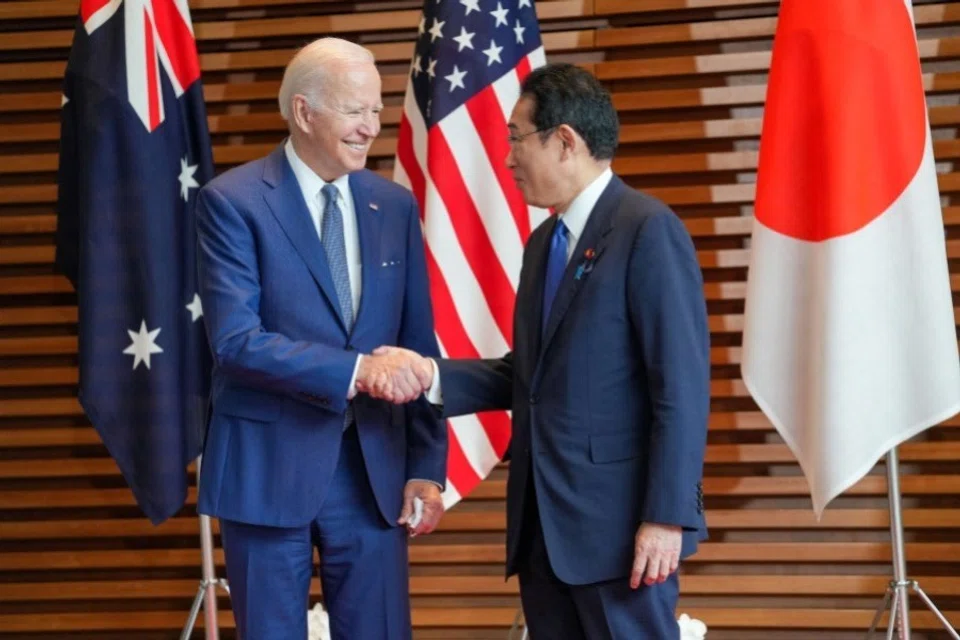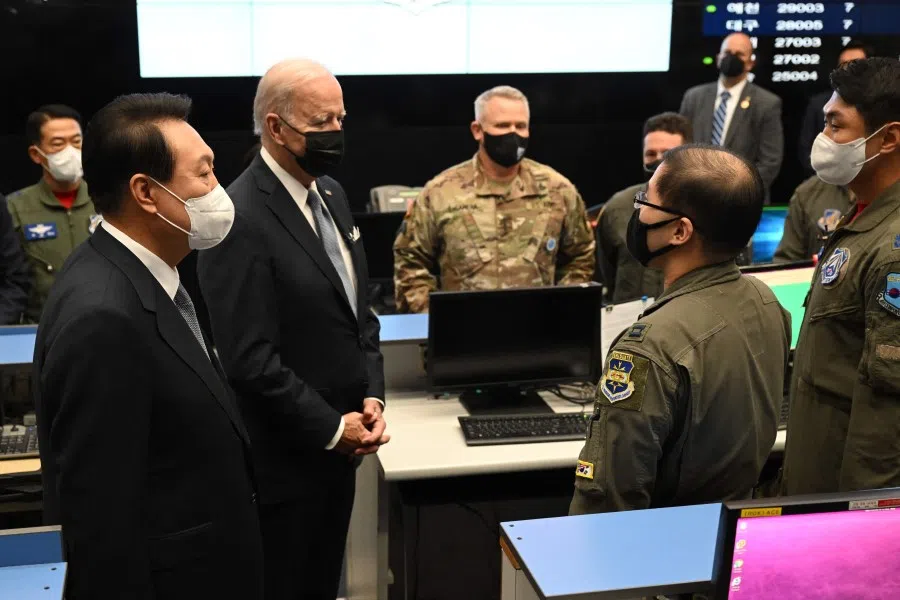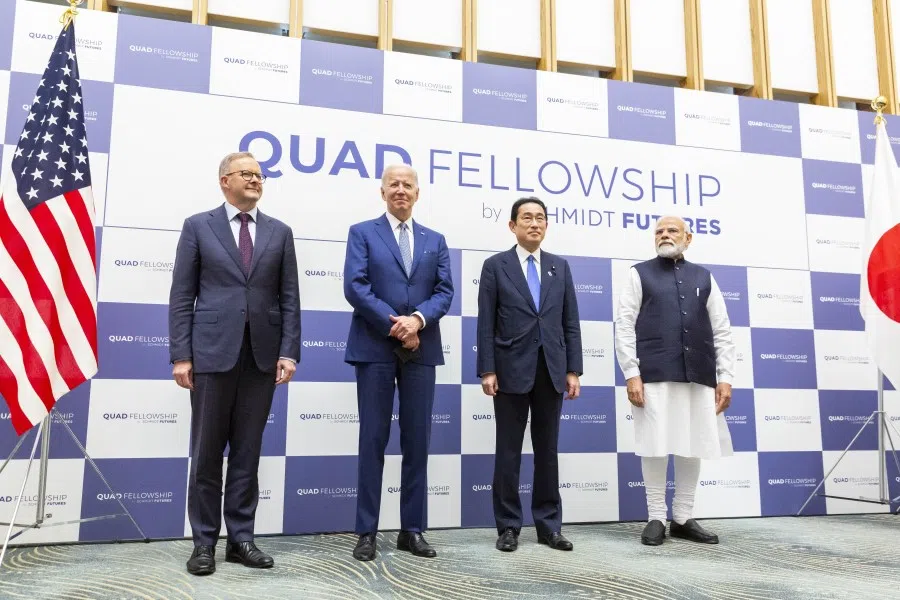Biden's Asia tour: US deepening its commitments to counter China
US President Joe Biden's recent visit to Asia was made with China in mind, as he met with Quad partners South Korea, Japan, Australia and India, and launched the Indo-Pacific Economic Framework (IPEF). At the very least, says Japanese academic Ryo Sahashi, the visit signals that the US is keen on setting the rules in the region and keeping a firm security presence especially vis-à-vis the Taiwan Strait.

An important month in Asia for US President Biden has just ended. The Biden administration may be expending a lot of energy on the Russia-Ukraine war, but there has been no change in the perception that China is the opponent to beat for achieving the most strategically important results.
Thus, it is no surprise that the month concluded with the announcement of the Indo-Pacific Economic Framework for Prosperity (IPEF) and a summit between the leaders of Japan, the US, Australia, and India after Biden hosted the US-ASEAN Special Summit in Washington and visited South Korea and Japan to strengthen the US's strategic Indo-Pacific position.
Biden's meetings with the leaders of allied Japan and South Korea were a huge success, following up on the summits held in the spring of 2021, regardless of the fact that there are new prime ministers in both countries.
In joint statements released during Japan-US talks and Japan-Korea talks last and this year, the countries affirmed their traditional alliances and emphasised that they would deepen their cooperation in economic security and S&T (science and technology), in addition to agreeing on security issues concerning the Korean peninsula, China and Taiwan, and the Indo-Pacific region. These areas indicate the direction that the alliances would be taking to face a rising China.
... both Japan and South Korea are clearly beginning to alter their strategies for China as allies of the US.
Of course, Japan and South Korea both have a close economic relationship with China, and it cannot be said that these two countries are forming policies against China from the same ideological perspective as the US. Even so, both Japan and South Korea are clearly beginning to alter their strategies for China as allies of the US. Especially for Japan, the urgency of preparing for a Taiwan Strait contingency drives its politics toward more robust cooperation with the US and an increase of its defence budget.

During this trip, President Biden announced the start of negotiations for the Indo-Pacific Economic Framework (IPEF). Perhaps no one considers this to be a replacement for the Trans-Pacific Partnership (TPP). It does not include access to the US market as part of the negotiations, and it is unclear how far participating countries will go with serious discussions, even if the US worked hard on this framework with APEC in 2023 in mind.
...even if we cannot expect a return of the TPP, some views hold that it is better to have the IPEF than nothing at all as this shows that the US is keeping an interest in setting the rules in the region.
However, even if we cannot expect a return of the TPP, some views hold that it is better to have the IPEF than nothing at all as this shows that the US is keeping an interest in setting the rules in the region. It would be good for Japan and other Asian countries who value free trade to effectively participate while keeping the discussions away from strong protectionism and industrial policy.
Actually, in international trade negotiations, it is more noteworthy that China has indicated an interest in joining the Comprehensive and Progressive Agreement for Trans-Pacific Partnership (CPTPP). In that respect, if we think strategically, it is extremely important for Japan and other participating countries to urge China to deepen its domestic reforms but accession negotiations with China is premature.
Quad cooperation more functional than normative
On the other hand, how did the discussions with the leaders of the Quad (Japan, the US, Australia, and India) go? Frankly speaking, the main goal of this meeting was to continue cooperation that will lead to the future establishment of regional order without giving up on India's involvement, even as India's stance on Russia was clearly shown to be different from the other three countries.
While a deepening of maritime cooperation was announced at this meeting, this does not mean that it has developed into a high-level security framework that will lead to the formation of an Asian NATO as some critics have suggested. The primary objective of the Quad cooperation is for more functional and normative cooperation.
...the current US president sees great significance in announcing the US's intent for military intervention to defend Taiwan as a way of deterring China.

Even so, it is significant that Indian Prime Minister Narendra Modi came to Japan and the four countries agreed on wide-ranging cooperation. The idea that various layered systems should be established in the region is deep-rooted, and as a framework between a small number of countries, there is great significance for India in continuing its participation at the prime ministerial level with its US, Japan and Australia counterparts, as India is full of growth potential and has a significant influence over the Indo-Pacific region.
And yet President Biden's statement at the end of his Tokyo press conference on his determination to offer military intervention to defend Taiwan is surprising. It is difficult to view this as a simple slip of the tongue, and at the very least, it shows that the current US president sees great significance in announcing the US's intent for military intervention to defend Taiwan as a way of deterring China. It will be worth noting how China goes beyond verbal criticism and takes action in response to Biden's statement.
Biden's intentions will likely not change however China responds. The US is deepening its own efforts as well as real security cooperation with Taiwan, and the Japan-US alliance is also changing with Japanese security and the inseparable Taiwan situation in mind. The Biden administration is certainly maintaining dialogue with the Xi Jinping administration even now and they are not including Taiwan in the IPEF, but even so, Biden's statement shows a strong preference towards supporting Taiwan and deterring any challenges from outside.
This article was first published by ISEAS - Yusof Ishak Institute as a Fulcrum commentary.


![[Big read] When the Arctic opens, what happens to Singapore?](https://cassette.sphdigital.com.sg/image/thinkchina/da65edebca34645c711c55e83e9877109b3c53847ebb1305573974651df1d13a)

![[Video] George Yeo: America’s deep pain — and why China won’t colonise](https://cassette.sphdigital.com.sg/image/thinkchina/15083e45d96c12390bdea6af2daf19fd9fcd875aa44a0f92796f34e3dad561cc)
